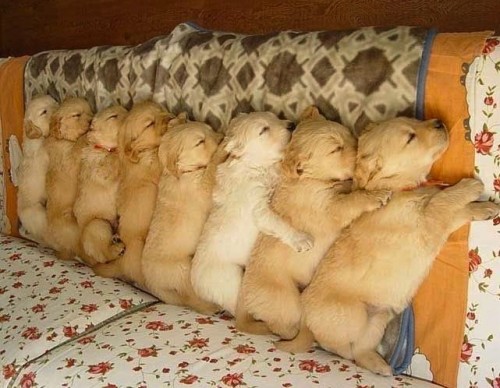Craft Notes
Dreams dreaming drone drum ho hum
Look at these cute golden retriever puppies. They’re probably dreaming. That’s cute. I like that.
But this post is not about golden retriever puppies.
Yeah, so last night, I had a dream. I died, but it wasn’t bad. I went to some version of afterlife. I went down an elevator (cliche, anyone?). Someone tried to escape by jumping out at sub-level 8. I don’t know what happened to that person. I think he looked like Mike Kitchell crossed with Adam Jameson. And when I got out of the elevator, I definitely wasn’t in heaven.
Or hell, surprisingly, for that matter.
It was kind of like a hotel. And everyone wore silk pajamas, cream colored with polka dots. It seemed like a pretty swell place. Kind of like a socialist utopia. Everyone had the same apartment-home with the same furnishing, and everyone wore the same comfortable clothes. And then I woke up. (Jesus, I hate that line even more than I hate dreams in fiction.)
I don’t hold much – if any – stock in dreams.
And I especially hate when dreams appear in fiction, like they have significance, but really, it’s just a cheap trick for writers to get across some magical realism moment or theme or some shit like that and they’re too scared to put it in “real life.” (But I’ll admit it: I’ve put dreams in one of my stories and two novels. Hypocrite.)
Am I wrong about dreams? Do they have a place in fiction? And if so, what role should they play?
Tags: dreams


“If the pages of this book contain some successful verse, the reader must excuse me the discourtesy of having usurped it first. Our nothingness differs little; it is a trivial and chance circumstance that you should be the reader of these exercises and I their author.” -Borges
Writing fiction is a form of dreaming, as is reading, as is living. Read Borges’ Libro de Sueños (The Book of Dreams) for examples of dreams in literature.
I like dreams. I believe they have a way of revealing the subconscious, but because we’re so detached from our subconscious we can’t relate to it and on the surface they just seem weird. Which is why I like them in fiction. Dreams in fiction can be riddles telling you exactly how a character feels about something if looked at from the right angles.
I also like writing dreams because it sort of requires you to turn off organized thought and let whatever pops into your head come out, and I find more often than not the connections between the real world and these dreams can be found. Granted I don’t use dreams too often in my fiction, but I love hearing people’s dreams, reading about dreams, etc.
For a period of about three years, I wrote down all my dreams, as did my girlfriend at the time (we were living together). Our plan was to eventually “write through” them all, turning them into a single novel, a “dream novel.”
We never did it, but I did turn one of those dreams into a short piece, “Caracas,” which made it into Amazing Adult Fantasy.
Actually, when I was a little kid, the first story I ever wrote (I think) was based on a dream I’d had. I also drew a large illustration, trying to spatially record my impression of the dream.
It must have been a good dream.
somewhere between 50-70% of what i’ve written has in some way come from a dream i’ve had
Dreams are OK, but I prefer nightmares. In fiction, anyway. As long as they’re warped and maybe a little funny. Imagine somebody having a recurring dream about an ironing board, for example. Or a number. But it’s true – dreams in fiction are often kind of boring and outside the story. Things can slow down too much – and the dreams in fiction sometimes don’t really feel like dreams but like cheap tricks. And too descriptive. I write them though. In stories, I mean. After all, everybody has them – even people who don’t really exist. As to their role in fiction…? Yeah, you’ve got a point there.
also, me crossed with A D would be interesting, as in some regards we’re physical opposites: a d is tall while i am short, he has dark hair while i am blonde, i wear glasses whereas he doesn’t, A HYBRID FORM FOR SURE lol
Frankenstein came from a dream Mary Shelley had. And coleridge’s kubla khan for that matter. So as for inspiration yes, but as a literary device probably not. Fiction is a way for the reader to experience the dreamstate while awake, so i guess it’s redundant as a trope. Like protesting for the right to protest.
also, nice puppies.
So, the swell utopic place in your dream was clearly &Now, and the dream was about how sad you were not to be here with us.
I find those golden puppies kinda uncanny. Theres a creepy assembky line simulacra thing happening there.
On the subject of dreams, my impulse is to say that the most effective dream texts are those where the dream is the text, or the text is dream, rather than those that use dream as device.
But I a sure there is really good work that disproves this like any other time we make pronouncements abt what should or shouldnt be written abt.